Will Work For Food @ Poznan Biennale
KHJ September 9th, 2010 Poznan
KHJ September 9th, 2010 Poznan
KHJ October 30th, 2009 Augsburg
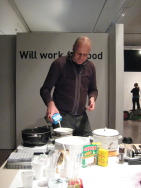
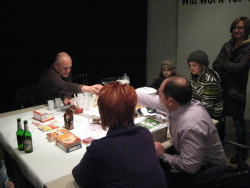
lab30, Augsburg’s Media Arts Festival, is going to take place this year for the 8th time. From November 5th to November 7th, Kulturhaus abraxas in Augsburg will be transformed into an international arts laboratory for media and installation artists, for sound, electronics, technicians and digitals artists who make up the offspring of the European arts academy scene. This festival of electronic arts has found its level within the relevant festival landscape, moving on from being an insider’s tip to becoming a constant in the yearly agenda of visitors and artists who travel the scene.
work for food or should we say “cooked with food and entertained by roboters. Mario Purkathofer
KHJ December 19th, 2008 Berlin
tatsächlich gibt´s Bilder von der feierlichen Übergabe, als ich Dich und das Projekt kurz vorstellte.
Auch in der Doku is eine kurze Sequenz. Siehe hier:
http://www.youtube.com/watch?v=qzSm1QP8NAQ
Das Robotterchen hat am Mittwoch bei Der Langen Nacht des Kurzen Glücks im Rotem Salon um 23 Uhr seinen Besitzer gewechselt.
Es wurden viele kurze Berlin-Filme gezeigt und zwischendurch die Auslosung gemacht. 10 Gewinner wurden am Sonntag geehrt. Das Maschinchen lag im Korb eines Menschen, den ich für kunstbegabt halte.
Matthias Groll
www.daskurzeglueck.de
www.interfilm.de

KHJ December 15th, 2008 Berlin
Matthias Reichelt brought a nice collection of red wine, cheese, bread and a cake. He will use the robot as a wedding gift. 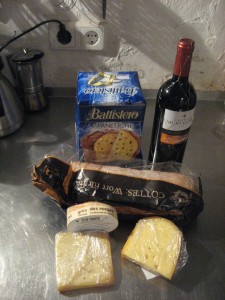
1. Castillo Murviedro 2005 Valencia, Spain (Red) Dry nose. Fresh and fruity, sweet tannins, prunes, vanilla, spicy.
2. Gruyère is sweet but slightly salty, with a flavor that varies widely with age.
3. Gres des Vosges is a traditional soft-ripened, washed rind cheese. It is a true farmhouse delight.
4. The Moosbacher cheese owes its uniqueness to a double ripening process.
5. Sourdough (or, more formally, natural leaven or levain) refers to the process of leavening bread by capturing wild yeasts in a dough or batter, as opposed to using a domestic, purpose-cultured yeast such as Saccharomyces cerevisiae.
6. Panettone is a typical bread of Milan, usually prepared and enjoyed for Christmas and New Year around Italy, and one of the symbols of the city.
KHJ November 10th, 2008 London
Elvina wants to have a robot. She sent a parcel with nicely looking Tesco products. Read what she wrote:
its a credit crunch parcel!
might be better to look at than eat!
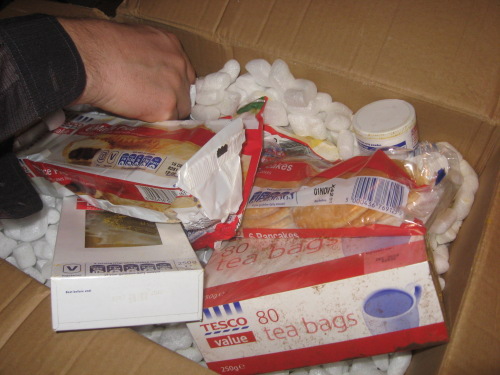
Tesco plc is a British-based international grocery and general merchandising retail chain. It has the largest British retailer by both global sales and domestic market share with profits exceeding £2 billion. Orange jelly cost 1p more than red jelly.
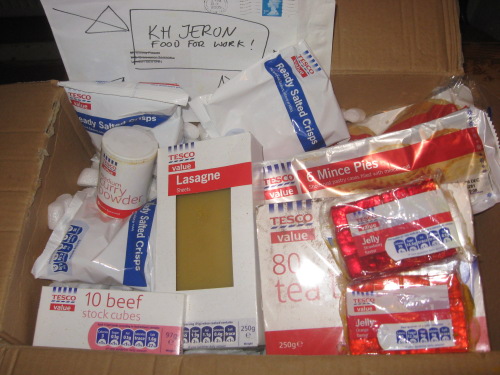
In 2008, Tesco became the world’s fourth largest retailer, the first movement among the top five since 2003. Originally specialising in food and drink, it has diversified into areas such as clothing, consumer electronics, consumer financial services, retailing and renting DVDs, CDs, music downloads, Internet service, consumer telecoms, consumer health insurance, consumer dental plans and software.
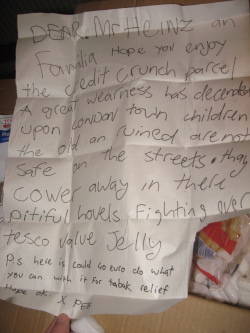
KHJ October 23rd, 2008 Istanbul
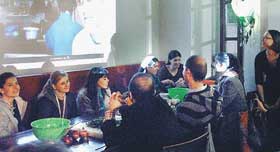
Dozens of people gathered Saturday evening in a Galata restaurant to learn to make falafel with a twist: The chef was projected large and wizard-like over their heads via the Internet live from Berlin.
Julie Upmeyer and her “Virtual Chef” initiative held their borderless feast at Güney Restaurant, one of 40 venues that hosted events this weekend as part of this year’s art festival Visibility Project in Istanbul’s Galata neighborhood.
Upmeyer said she was amazed by the way cooking brought people together. “Chefs from the Güney kitchen worked side-by-side with Virtual Chef guests to fry falafel balls, while Galata locals were speaking live with our chef in Berlin in Turkish, English and German.”
Hoping to open people’s eyes to the “unseen,” the one-day fest combined everything from art exhibits in teahouses to oddball performances on sidewalks. In this respect, Virtual Chef’s connection to a chef in Germany, who had sourced his ingredients in exchange for providing a service, certainly suited the vision of the festival.
The story behind the dish
The project began when chef Karl Heinz Jeron sent the group a list of ingredients to collect for the meal. As they searched for the ingredients, the participants met people and explored places and shops new to them. While watching each other via a live media stream on Internet TV, Jeron shared with them the story behind his version of the falafel.
His project “Will Work For Food” explores the labor and barter economy. During the project, he provided small robotic vehicles that traded their manpower for food. The vehicles can draw and whistle. In exchange for a bit of food, people borrowed the vehicles to serve their needs. He received lentils, flour, arugula salad, garlic, lemon and some spices and herbs.
That’s when a falafel recipe came to Jeron’s mind. He customized the recipe, replacing the chickpeas with lentils and adding flour to make the dough a bit more solid. After practicing for some time, he agreed to join Virtual Chef and share the fruits of his barter.
A native of Detroit, Michigan, Upmeyer said food was universal and commonplace, though ultimately quite personal. “Eating is the closest connection our body has to the outside world.”
Julie Upmeyer caravansarai.info@gmail.com or julie@active-ingredient.net
KHJ October 21st, 2008 Istanbul
The Turkish food delivery travelled from Istanbul to Amsterdam and finally to Berlin.
Looks like I am able to prepare proper Köfte burgers now. Cheers to Julie Upmeyer who runs Caravansarai a
meeting point and project space in Istanbul.
KHJ October 13th, 2008 Istanbul
Public cooking session at:
Caravansarai
meeting point and project space in Istanbul
http://www.observer-in-residence.net/virtual-chef-galata/
| Date: |
Saturday, October 18, 2008
|
| Time: |
7:00pm – 10:00pm
|
| Location: |
Güney Restorant, Galata Tower Square / Güney Restorant, Galata Kulesi Meydan?
|
| Street: |
?ahkap? Sok. 28 Kuledibi
|
| City/Town: |
Istanbul, Turkey
|
I will cook one of my Will Work For Food favourites. The cooking will be transmitted from Berlin to Istanbul via Skype.
18 Oct 2008 9pm GMT
Virtual Chef – Galata
Saturday October 18th, 2008
Günay Resteraunt, Galata Tower Square, Istanbul, Turkey
19:00 (21:00 GMT)
We will be connected to Karl Heinz Jeron in Berlin, Germany,
who will instruct us how to make his special version of Falafel.
The project began by making a connection with Karl, who sent us a list of ingredients to collect for the meal.
We then start our research.
– Where can we find these ingredients in Galata?
– How does the culinary traditions of another region affect the tastes of Turkish ingredients?
As we source the ingredients, we gather information, meet people, explore new parts of our surroundings.
On the night of the dinner, as part of the Visibility Project – 4 in Galata, we are connected live to our ‘virtual’ chef with sound and video.
He takes us step by step through the cooking of the meal, sharing memories or other stories associated with the food being cooked.
When the food is finished, we eat together.
KHJ September 8th, 2008 Newark NJ
Interactions with the robots throughout Europe have taken various forms: small offerings of packaged sweets, regional specialties, homemade foods, and even full dinners. In Newark, Gallery Aferro and KH Jeron will have the robots perform in the gallery as a food drive to question the collective responsibility of a city’s residents towards each other.
According to Jeron, Will Work for Food deals with “a re-assessment of labour: its disjunction from covering the cost-of-living of the individual.They give an occasion and a space for social interaction and discussion.”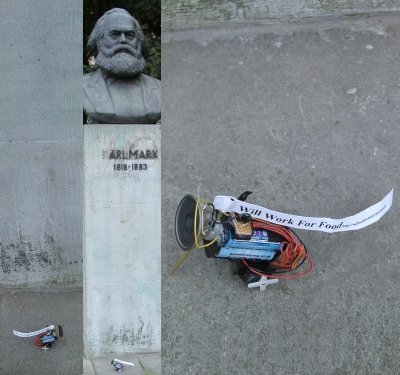
Outside Over There
Fourth Annual In the Country of Last Things exhibition
Curated by Emma Wilcox
September 27 – November 22, 2008
Opening Reception September 27, 7-10 PM
Artists:
Keliy Anderson-Staley, Mireille Astore, Martin John Callanan, Karlos Carcamo, Margarida Correia, Susan E. Evans, Judith Hoffman, KH Jeron, Tamara Kostianovsky, Charles Huntley Nelson Anne Percoco,
Dorothy Schultz, Jeff Sims, Peter Tuomey Jr, Tammy Jo Wilson
Bad luck. The traditional brown cheese sent by Per Henrik Svalastog (Baktruppen) decayed because of the summer heat. It soaked through the wrapping … The German Post has put it in a plastic bag.
“I sent you a piece of traditional Norwegian brown cheese. Made of goat milk, and quite sweet. The colour is red/brown because it is boiled quite a lot and because it is boiled in an iron kettle. This is one of our main food-sources for iron! We use to eat it with bread and butter. Or we put it in a souce with game meat. It is probably a bit “different” from what you have tasted before, but I am sure it is possible to use it in many different areas. Norwegian kitchen is mostly about survival. It was develloped before we found the oil. We have not really any cultivated dishes. So the culture for exploring our resources in the kitchen is not here. I guess it is up to you to find out how you want to use it.
Usually I keep a piece of this cheese for 4-6 weeks. In the fridge. I dont know what summer heat may have done with it, but I think that if it taste eatable (but “different”) it is good. Hope everything is ok.”
Fantastic food from Dresden arrived.
Harriet and Peter from Norten Comander Productions have sent:
Bohemian Oblaten with Chocolate Cream made from the original Karlsbad recipe. These thin chocolate wafers are slightly sweetened and have a delicious chocolate cream filling. Each wafer is approximately 7 inches round.
2006er Weißburgunder Pillnitzer Königlicher Weinberg – o.G. Winzergenossenschaft Meissen- Sachsen [Saxonia], 2006
Delicious local honey
Organic sheep chees from Schuberts Milchschafhof
and Dresdner Russisch Brot by Dr. Quendt
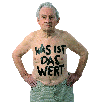
„Was ist das WERT“ Festspielhaus Hellerau
Karl-Liebknecht-Straße 56 • D-01109 Dresden
The Wert/Value perfomance reenacts Karl Marx’s contribution (VALUE, PRICE AND PROFIT) to a discussion on trade union activity that took place at a meeting of the General Council of the International Working Men’s Association in April, 1865.
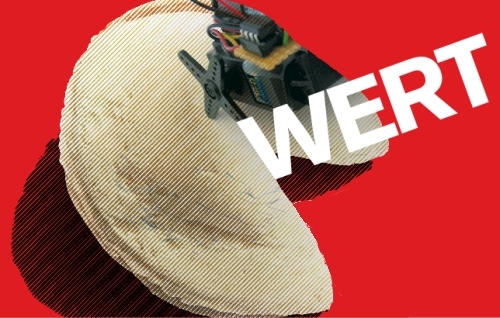
While baking fortune cookies and reading chapter VI (Value and Labour) of “Value, Price and Profit”, one of my vehicles is drawing and whistling the Internationale. The cookies are filled with snippets of the drawings.
VI. Value and Labour (Economic Manuscripts: VALUE, PRICE AND PROFIT)
Citizens, I have now arrived at a point where I must enter upon the real development of the question. I cannot promise to do this in a very satisfactory way, because to do so I should be obliged to go over the whole field of political economy. I can, as the French would say, but “effleurer la question,” touch upon the main points. The first question we have to put is: What is the value of a commodity? How is it determined?
Some nice people form Zurich have sent typical Swiss food: chocolate, spice, sweets, Rösti and Ricola candies (Yes, they cure a sore throat). It traveled more than three weeks. I think it got stuck at the customs. The sweets immediately went through my son’s quality control. He judged them excellent.
KHJ January 13th, 2008 Stuttgart
Opening 17. Januar 2008 at 18.30 h
Kunstbezirk in the Gustav Siegle Haus
Leonhardsplatz 28
Stuttgart – Mitte
I received a bottle of Alsace Kirsch form Bertrand Distillery. The Alsace Kirsch tastes like fruit, fruit and more fruit…Concentrated, round.
You have to wait several years to build a Kirsch like this!
Unprecedented – It has the scent of cherry flesh and juice, it’s fresh and true emphasised by being slightly nutty.
This is me cooking at the Filmwinter Stuttgart. Read more about Filmwinter at http://filmwinter.de
After six hours constant cooking, all food was prepared and eaten up. The guests were happy. Thanks to the Slivovic and the fantastic marmalades.
Some of the guests brought food and swapped it for vehicles. I got tuna, mustard and some nuts.
Tina Marie brought a letter by Elisabeth from London, which arrived at allgirls gallery recently. It is a request for a vehicle. Elisabeth sent some chocolate bars in advance.
KHJ September 27th, 2007 Berlin
Großes Will Work For Food Erntedank Fest im Ausland / Big Thanksgiving Party at Ausland
Lychenerstrasse 60 Berlin-Prenzlauerberg
am Sonntag, den 7. Oktober
Beginn 17.00 Uhr
Eintritt frei
Seit Januar tauschen einige meiner Robotervehikel ihre Arbeitsleistung gegen Lebensmittel. Diese werden zum Erntedankfest für Euch zubereitet. Ich koche Sabzi Polo, backe Kartoffelecken und Crêpes mit acht verschienden Marmeladen. Dazu gibt es reichlich Sliwowitz. Selbstverständlich kann vor Ort erneut getauscht werden. Zur Unterhaltung gibt es Musik, eine Diashow und die Roboter werden tanzen.
KHJ September 20th, 2007 London
Aoife van Linden Tol sent these sensational British bangers.

They’re a bit fat, so either can par-boil them before grilling on the BBQ, or simply grill them on a lower flame. Aoife also swapped a big chunk of Berkswell ewes’ cheese.

The village of Berkswell was named after the Saxon chief, Bercul. He was baptised in the ancient well at the centre of the village, and the village became known as ‘Berculs Well’. Over the last thousand years, the name has evolved into ‘Berkswell’. The eponymously named cheese is made by a small family run business in the village.
Ram Hall is a sixteenth century farmhouse with very little changed from the original. Steven Fletcher started as a dairy farmer, keeping cattle for milk sales only. In the early 1980s the cattle were slowly replaced with sheep, and it was only through a quirk of fate that his cheesemaking career took off. A local shop which used to sell goat’s cheese lost their supplier and asked Stephen if he could make ewe’s milk cheese. Never one to shirk a challenge, Stephen set about the task of making a new ewe’s milk cheese from scratch. Originally made using a recipe for Caerphilly, Berkswell soon developed a character of its own, more akin to Manchego than the Welsh cheese.
Stephen now has the help of his wife Tessa and the cheese is made 2-3 times a week from the milk of their flock of 350 Frieslands. Berkswell is a hard full fat (45%) unpasteurised sheep’s milk cheese made with vegetarian rennet. It is matured for up to eight months and weighs 3-4 kg, measuring 20cm in diameter by 8cm high. Once matured, the rind becomes heavily textured and pitted.
This cheese goes well on the cheeseboard as well as being an excellent cooking cheese, with a more delicate flavour and smooth texture than say a Pecorino. It grates well and is wonderful in potato dishes. It is also a good alternative to cheddar for those suffering from cow’s milk allergies. (http://www.teddingtoncheese.co.uk)
Gisa Ölmayer while unpacking the vehicle she received.
Read what she answered, when she was asked how she made all these delicious marmalades:
"die wird immer erst im topf gemischt, gebastelt, abgeschmeckt, hin-gewürzt. bis auf "jules normale zwetschge". die ist 1 zu 1 zwetschge und gelierzucker, aber die ist viel zu flüssig..."
This link leads to a porposal for a directive relating to fruit jams, jellies and marmalades and sweetened chestnut purée intended for human consumption by the commision of the european communities.
And read what wikipedia says.
Shirin Homann Saadat sent rice, saffron, mixed spices and sweets.
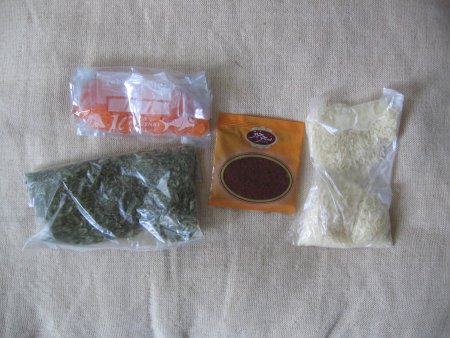
Shirin wrote: “Es ist ein Kräutergemisch, das normalerweise mit dem Reis “Polo” verkocht wird, dann heisst das “Sabsi Polo” Kräuter bzw grüner Reis. Die Bonbons legt man normalerweise in den Mund und kippt Tee nach. Es gibt viel bessere, wo Sesam oder Safranfäden drin sind, diese waren schon etwas “verwittert”, aber die einzigen, die ich noch hatte.”
This means that I am half way towards cooking a perfect Iranian dish.
Sabzi polo (Persian: ???? ???) is an Iranian (Persian) dish of rice and chopped herbs, and is usually served with fish. In Persian, sabz means green, and sabzi can refer to herbs or vegetables. Polo is a style of cooked rice, known in English as pilaf.
The herbs used in sabzi polo vary, but typically include coriander, dill, chives or scallions, fenugreek, and parsley.
Iranians traditionally eat sabzi polo “with white fish” for lunch on norouz, the Iranian new year, with their family and relatives.
After Kurt Rudolf received the Will Work For Food vehicle at the Blumberg in Vienna, he went to Krummau. Krummau (Cescy Krumlov) is a small UNESCO world city in the South Bohemian Region of the Czech Republic. It is best known for the fine architecture and art of the historic old town and Krumlov Castle.
Labor K1 asked for two vehicles. K1 is an artistic research laboratory by Jana Linke and Juliane Zelwies.
Watch the vehicles working at K1 Soldinerstr. 35 in Berlin.

In return they sent this really nice cake (Engadiner Nusstorte).

The mission of the Ludwig Boltzmann Institute Media.Art.Research is to archive, publish and perform scholarly work on media art and related media theory including the extensive holdings of the Ars Electronica Archive. Maybe thats why they asked for an assiduous robot vehicle. They promised to send a Linzertorte.
“research and reconstruction of robot by Dr. Katja Kwastek at media.art.reseach institute Linz”
From time to time the vehicles need some repair …
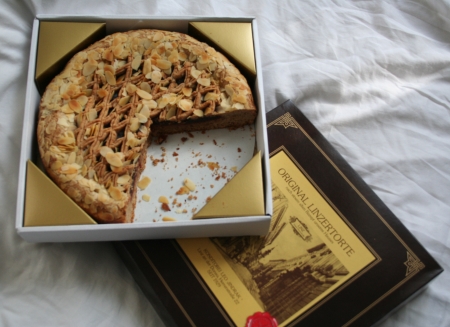
There was a Will Work For Food Dinner at the Blumberg in Vienna on Saturday 30 June.
Thanks to Edith, Florian and Geoffrey we had an amazing dinner at the Blumberg.
Have look at the menu:
cabbagerolls filled with minced meat and unripe spelt grains
vegetable soup with sorrel and roasted dumplings in a napkin (Serviettenknödel)
gilthead filled with hyssop and slightly breaded with corn flour
People swapped vehicles and promissed to take them round the world and send international food. I am excited.
Beef Jerky arrived.
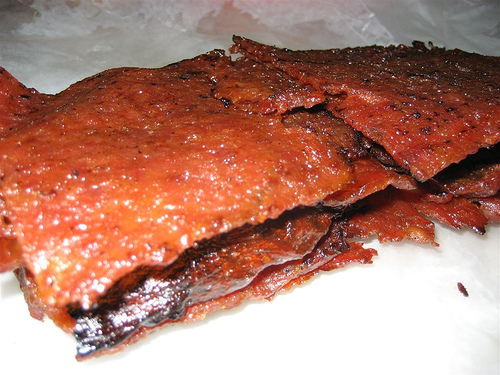
Jerky is meat that has been cut into strips trimmed of fat, marinated in a spicy, salty or sweet liquid, and then dried with low heat (usually under 70°C/160°F) or occasionally salted and sun-dried. The result is a salty, stripped, semi-sweet snack that can be stored without refrigeration. Jerky is an early application of food preservation techniques.
From Mayday to the end of may Will Work For Food is temporarily located at KunstRaum Goethestrasse in Linz, Austria.
Please visit: http://willworkforfood.servus.at
Working for the Austrian Communist Party (KPÖ) in Linz while Mayday.
On 1 May a group of vehicles is going to demonstrate on the main square of Linz, the Hauptplatz. From that time on, the residents of the Neustadt quarter and interested visitors can pick up vehicles at the gallery KunstRaum Goethestrasse.
The “Will Work For Food” happening takes place from 25 to 27 May at the KunstRaum Goethestrasse and deals with the desire to find a new definition of labour. The event centres on new ideas of what work means to the individual and focuses on the disjunction of work from covering the cost-of-living of the individual. “Will Work For Food” provides an occasion and a space for social interaction and discussion. On location, in the gallery, the bartered food will be prepared and new vehicles will be produced.
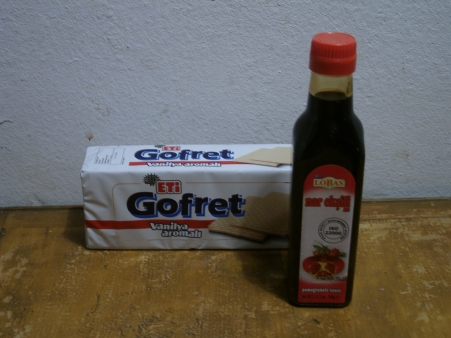
My friends Christoph Tempel and Christine Kriegerowski took a vehicle to Istanbul. They gave it to Genco Gülan from Instanbul Contemporary Art Museum. As Christoph and Christine said, Genco realy liked the perfomance of the vehicle. He donated the cookies. The vinegar made from pomegranate is a gift by Christoph and Christine. They could not resist to try out the vehicle.
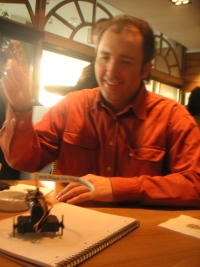
Genco Gülan with “Will Work For Food” vehicle in a cafe in Instanbul
KHJ April 14th, 2007 Montpellier
still working for annie
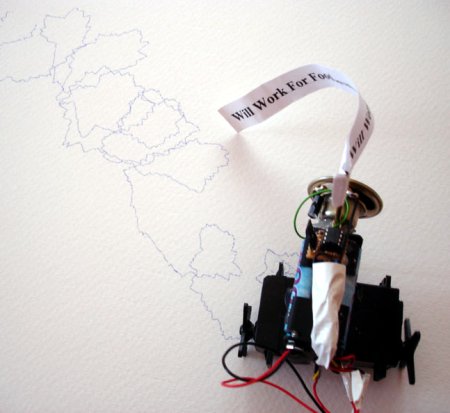

Chocolate was sent because Richard Wright of Mongrel was the first through the door of HTTP gallery. He gave the instruction about exactly what to send.
Delicious organic dark chocolate with exotic orange essence, perfectly balanced by the warmth of cinnamon, nutmeg and a hint of vanilla. By purchasing this bar, you are directly supporting small-scale farmers through direct trade, fair prices, community development and environmental sustainability.
KHJ March 31st, 2007 Montpellier
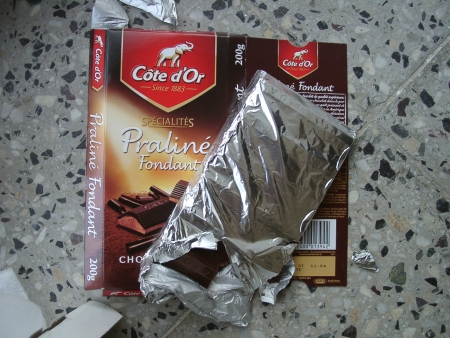
Known as the “elephant” chocolate this Belgian product is one of the best known chocolates in the world. Registered in 1883 by two chocolatiers,Michiels and Bieswal, the name comes from the West African coast of Ghana known as the“Gold Coast”. Cocoa beans produced in this region are known for their bold taste. Try this chocolate that has been truly a giant in the chocolate industry.
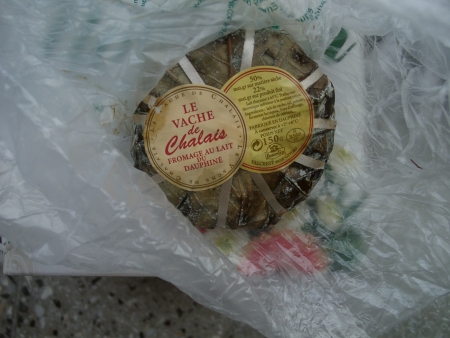
Thermalized cow’s milk. Made in Dauphiné.
A little natural rind cow’s milk cheese wrapped in chestnut leaves.
KHJ March 30th, 2007 Montpellier
KHJ March 28th, 2007 Montpellier
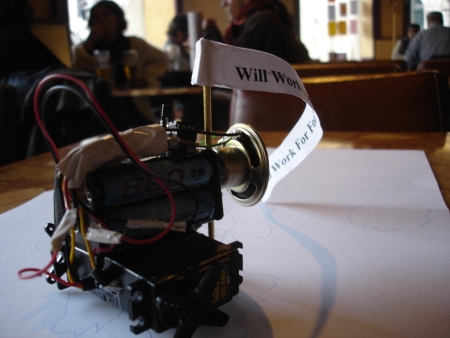
“Will Work For Food” vehicle working for Annie Abrahams.
See her websites:
http://www.bram.org
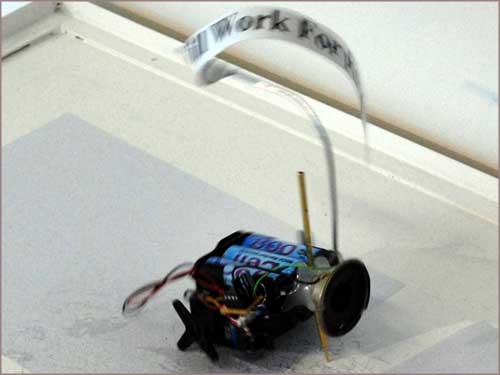
photograph by Pau Ross
Do It With Others(DIWO):
E-Mail-Art at NetBehaviour
An E-Mail-Art project on the NetBehaviour email list culminating in an exhibition at the HTTP Gallery in London.

Private View: Thur 1st March, 7 – 9 PM
Exhibition: 2nd March – 1st April
Friday – Sunday: 12noon-5pm
For more information about DIWO
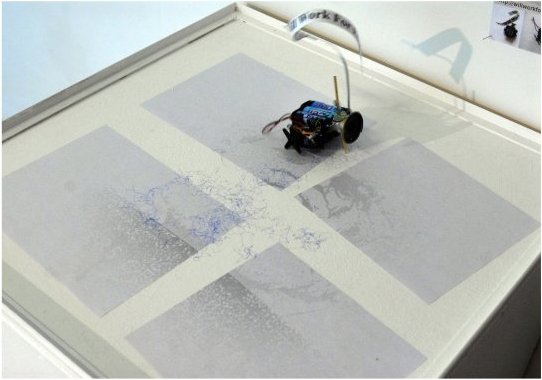
photograph by Pau Ross
DIWO opening